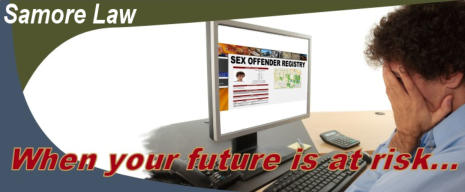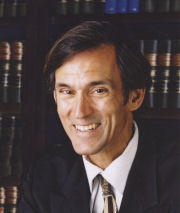

John Samore
Blog: Lawyer’s Insight on
Legal Matters:
- Sex Crimes -
"Lawyer's Insight' is a periodic blog by Mr. Samore on
current legal issues that informs readers how current, legal
events influence Americans' lives. If you would like to ask
Mr. Samore to address a particular concern which you may
have, simply send an email to the address at left with
subject "Questions for Lawyer's Insight."
Click on the links below to quickly reach a particular topic,
or just scroll down to read what is of interest. Other sources
of information from Mr. Samore are on the Common
Questions and About Us pages of this website.
If you don’t see a link to a topic of interest, check the other Lawyer’s Insight pages. You can
also see the Sex Crimes / Sex offenses page.
Sex Crimes
• OEO Allegations Against University Male Students - TITLE IX CASES • Do sex offender registration laws really protect us? • We hear a lot about prosecutions for child pornography; why does your office defend these kind of cases? There is also a case result “UNITED STATES V. Mr. F. [Sex Offense] [Not Guilty on Appeal]” on my ABOUT page that you may want to read.OEO Allegations Against University Male Students - TITLE IX CASES
August 2020 Another developing area of law, which our office has represented several young men the past few years, is young University male students, who are anonymously accused of violating University policies on sexual misconduct (ex. UNM Student Handbook, Sec. 2740). Only the young man is named in the allegation, made by some anonymous person (usually female), and the student has precious few rights under the recent interpretation of his rights, which make it even more important that he retain an attorney to represent him at the first notice of a complaint. No reasonable person denies that assaults on female students should be seriously addressed. Since 2011, following a broad but flawed investigation into campus assault with that lacked substantive accuracy [1], OEO administrators acted to bolster enforcement, hire investigators to commit to punishing presumed abusers, and monitor enforcement findings. In an eagerness to correct what was perceived as historical underreporting of sexual abuse on campus, OEO severely restricted an accusers opportunity to respond, be heard, and prepare. Funding for each university’s OEO office depend in significant part on the number of cases they attract, investigate, and find policy violations. The Office for Equal Opportunity ("OEO"), claiming authority under Title IX which sensibly compels universities to balance both athletic and academic considerations to prevent gender discrimination in schools that receive public funds, took broad enforcement authority. It has used for the past decade a "single investigator" model, in which the school designee responsible for investigating the assault is also at least one of the three people who make the determination of whether sexual misconduct may have occurred. The young man accused is not informed of his right to counsel by the investigator, and hundreds of young men have had their lives forever changed for the worse, due to an innocent willingness to talk to an investigator without counsel. The present OEO procedure does not give an accused person specific information on what the accuser has told him, she is not identified by name, and he is presumed to already know the scope of the allegation. The disturbing one-sidedness of the OEO process has increasingly been challenged, from many concerned authorities, including the letter from fifty-six Harvard University law professors to OEO (2009) and libertarian commentators [2] to the present President’s Education Secretary. Retired federal judge Nancy Gertner [3] was disturbed by the "low standard for evidence that condemns a young man by a mere preponderance": "True enough, except for the fact that civil trials, at which this standard is implemented follow months, if not years, of discovery (and) is worst in both worlds. The lowest standard of proof(,) coupled with the least protective procedure." Judge Gertner accurately describes how the accused person has virtually no right to learn the details of the allegation, so he risks being adversely judged because he says too much or too little. He is not permitted to directly question his accuser. While OEO investigators repeatedly assure the suspect that its records are "confidential" and it does not work with law enforcement, this representation is a rather brazen, functional fabrication of careful and misleading phrasing. OEO investigators readily forward their interviews, with or without a subpoena, to law enforcement authorities. The illusory representation that OEO investigators not work with law enforcement is further diluted by the fact that University Police often have ready access to these investigations. Once he receives often-horrifying allegations (also horrifying because details are unknown and often greatly exaggerated), the male student has few choices. An adverse OEO finding has grave consequences, but, should the allegation be found unproven, there is absolutely no consequence to the accuser. She gets a free shot at his life. The jeopardy to his academic opportunities and professional future cause some students to consider withdrawing or transferring from school, but OEO does not permit this option. It will continue its OEO investigation and enter its conclusion on the young man's permanent records, even withholding issuance of his transcripts. What this means to the accused is that he has little choice but to blindly participate in an unfair process or almost certainly be guaranteed that OEO will make unilateral adverse presumptions and find against him. OEO headquarters maintain records of each local office at universities to be sure that they find "probable cause of violation of university policy" at a subjectively sufficient percentage. Our own University of New Mexico was one of the universities in the recent past, criticized by OEO and threatened with a reduction of funds for its OEO office because it was not finding "probable cause" at a high enough percentage to satisfy OEO. The risk of bias in the system is obvious, and, because the people in the position of investigation and maintaining its process were hired to such full-time positions based on their beliefs, the likelihood of a fair finding is even more imperiled. An office receives no increased funding if it too often finds against the accusers. Let's take a look at how one of these cases developed when, because the young man decided to fight back and concede his good name would be disclosed in media coverage, resulted in Due-Process litigation. In 2016, the young woman at Kennesaw State University in Georgia claimed she had been raped by a male friend. She admitted the incident began as consensual fooling around and ended in nonconsensual intercourse, then, later, more specifically admitted that she let him spend the night, after which, they ate breakfast together in the morning and planned a date later in the day. Unfortunately, for the young man, he neglected to call back, and when the troubled young woman complained about being stood up to friends, they told her she should file a rape claim against him, which she did. Far too often, as even as many competent attorneys acknowledge, the broken date leads to “regret-sex” allegations. When describing her reluctance to allow an accused male student more information before he is compelled to be interviewed by OEO and balance the system more equally, Noreen Farrell, Executive Director of Equal Rights Advocates, who originally argued in 1977 that Title IX should include sexual harassment violations, now concedes, "We, in the advocacy community, who have been involved in Title IX for decades, understands this (additional rights to protect an accused) is nothing short of a catastrophe." Let us hope the pendulum, which swings from the equilibrium of justice, once against the accuser and now against an accused, may one day return to more balanced stability that is fair and respects all parties. Lawyer and political scholar Cate MacKinnon has been stirring indignation and alarm on male-female relationships for over thirty years, including misrepresenting frequency of sexual assault by claiming a subjective look alone is a sexual assault and that every sexual act "where a man is in the dominant position" equates to "rape" of a woman. Long deemed an extremist, she finally secured a broader audience with more influence on policy ten years ago as universities sought aggressive means to address what they believed were underreported campus assaults. The swing in popular opinion is evident in how acceptable it has become to ridicule men in any forum, be it network media comments or social settings. A tasteless joke or sexist comment about a woman is no less offensive were about a man. They are both wrong, and we all need be conscientious not to tolerate it any more than tolerate sexual assaults. Especially unsettling is how well-meaning people have been so eager to adopt extreme positions that are diabolically prejudicial to an accused person. They have made policy of "safe spaces" on campus and a long list of "trigger" terms that offend them -- ostensibly to protect tender student ears from the contrary opinions that earlier generations thought was the whole idea behind higher education: to learn by confronting and disagreeing with unpleasant. Many feminists and progressive thinkers have finally recognized that student authorities have gone too far. Columbia professor Laura Kipnis reminded OEO zealots, "The feminism I identified with as a student stressed independence and resilience; in the intervening years the climate of sanctimony about student vulnerability has grown too thick to penetrate." Progressive commentator Michelle Goldberg shared concerns that "demand for official censure and emotional injury demonstrate how correct (Dr. Kipnis) is" in her 2015 article for The Nation. Others are concerned that this narrow interpretation of Title IX responsibilities actually objectifies women and seems to erase a women's agency. The current Education Secretary conducted hearing on the bias and revisions that recognizes the accused students rights are scheduled to go into effect in late 2020. Harvard law professor Janet Halley, who long decried the historical "slipshod handling" of sexual-harassment and sex-assault cases, now warns, "It is a moment of danger" in setting boundaries that punish what is often standard campus behavior. "We cannot expect to change behavior without making women part of that equation." She was among the lead group of professors who challenged Harvard's Title IX policies in 2016 and eventually adopted different standard for the law school to the rest of Harvard. New Mexico universities adopted the more extreme OEO procedure which centralizes power into one OEO office that serves as investigator, judge, and jury for the accused student. John Samore adds that process does not afford the accused right of counsel nor do the OEO investigators warn an accused student that it will share his interview records with law enforcement nor do they give the young man a meaningful opportunity to decline to be interviewed. If he were to decline, it is certain that he will be found culpable and sanctioned by the university by expulsion or suspension. There is no consequence for a female student who makes a provably false allegation. As we have seen with United soccer players and Lobo athletes, even old and unproven OEO allegations have consequences that cost them jobs and scholarships. We now have much of feminism at outer poles, one that makes the self-defined "survivor" movement a matter of unquestioning acceptance, the other concerned with a sensible balance where truth is not a matter of faith alone. One that presumes women helpless and the male solely responsible, another that suggests joint responsibility. As Stanford law professor Deborah Rhode describes it, one that holds only the male responsible and another that recognizes the "moral ambiguities of the common dangers (to women and men) of excessive alcohol use." Or as John Samore (a father of five girls) describes it, one that raises children (be they female or male) to be responsible adults, The kind of procedural abuse in OEO campus investigations neither helps women be strong adults nor does it protect the falsely accused. References: [1] NPR and Center for Public Integrity, as well as the Rape Abuse and Incest National Network, each of which developed statistics that defined "rape" so broadly as to include far more alleged victims than it is likely were actually physically assaulted. It left the definition of "rape" largely to the mind of an anonymous group of students from only a few university campuses. [2] The day the Office for Civil Rights sends its letter to the suspect, the federal government has made "all sex unsafe on campus." [3] Judge Nancy Gertner wrote The American Prospect, 2015. See our sex offense crimes page.
Do sex offender registration laws really protect us?
July 26, 2013 As more and more people are being put on state and national sex offender registries, we are discovering the original intent to protect communities also have, in practice, many problems. There are no easy answers. Most of us would agree that some requirement that people convicted of serious sex crimes should have to register so that law authorities would know where they can readily be located can be helpful. Most of us would also agree that, if possible, we would like these convicted people to serve their punishment, fulfill their responsibility to pay their debt to society, get necessary counseling, and have a chance at becoming a productive member of society. How can we expect them to accomplish this transformation unless they can get a good job and have an opportunity to participate in some community? These problems, as we are learning, arise from trying to administer these laws fairly. First of all, some states publish of where these folks live, so they wind up being harassed by mean- spirited people, even beaten, or even killed. Their families, no matter how much they want to help restore their loved one, can also be mistreated and ostracized. If the offender cannot find work, they get discouraged, isolated, and cannot benefit from counseling as they might if they could see light at the end of this tunnel. Another real problem is how very differently our states define the type of crime that requires a person to have to register. The people are not just folks who have done horrible things to children. Many of the crimes for which one must register include Internet behaviors that never result in physical contact. For example, a high school senior could be curious, get on the internet, and look under some websites that may have child pornography. Once he has done so, even if he is only on the website for a few minutes, he has committed a serious felony that can readily be traced. Other folks get convicted for "Romeo-Juliet" relationships where (usually) the male is 18 or older and (usually) the female is under age. The difference between their ages varies from state-to-state, but, whatever the charge, if a person is convicted in one state and required to register, that person must almost always register in any state thereafter in which they might live. If another young man is "sexting" with a person who is under legal age, he can be found guilty of a crime for just that. What strict interpretation of these alleged age differences can be unduly harsh when the parties could be "role-playing" as part of a little flirting game. In some states, it is considered a "sex crime" to simply "annoy" a child, which would require New Mexico to enforce registration requirements that can last from five years to a lifetime. Oftentimes, the time period for compelling registration is set without the judge having the benefit of any "risk assessment' by a qualified psychologist. It is quite a challenge to strike a proper balance to protect us from the few serious offenders who might re-offend and not persecute many others, which may prevent them healing themselves as their victims also heal. Definitions of what actually constitutes a "crime" can always be difficult. define too narrowly, and genuinely bad people cannot be prosecuted; too broadly, and decent people's lives can be ruined. See our sex offense crimes page.We hear a lot about prosecutions for child pornography; why does your office defend these kind of cases?
July 5, 2016, updated May 20, 2017 When we attorneys are occasionally asked such a question, our first response is to consider who is asking and why. Usually the questioner is referring to why lawyers represent someone accused of, for example, hurting a child or possessing child pornography. The obvious (and accurate) answer is to pose to the questioner a better question: would you like to live in a society where people accused of especially "bad" crimes are not permitted to have an attorney? Who gets to decide what crime is so bad that the accused person is not even entitled to legal representation? You? Me? Someone else? Even when the evidence is especially strong of a person's guilt, we must also consider whether the penalty prescribed by law is fair. The punishment for most crimes in this country today is already more severe than it was here thirty or eighty years ago and far more severe than it is today in other civilized Western democracies, of which we like to consider ourselves the cultural leader. Here is an example we would like you to consider. Many outstanding citizens in this country have no criminal records, good jobs, and good families, but for some peculiar reason, develop an interest in child pornography. No one will claim child porn is a good thing, but it is all- too-easy for a merely curious person to access it on line. Almost 100% of people who view child porn never physically abuse any children, but the penalties for merely possessing child porn would lock them away in prison for many decades. Does someone who possesses child pornography deserve to spend fifty (or even fifteen) years in prison or should they spend a short time in prison and given an opportunity for treatment of their illness? Which option salvages the person and the family? Which option costs our society less? Oftentimes, the best ally in fairly resolving these difficult decisions can be a reasonable prosecutor. Too many prosecutors become full of themselves and the astounding power they have to push and push and push until the break a person or a crime or a race of people. They are never satisfied at solving a crime they zealously push for maximum punishment and humiliation. Fortunately, some others see the broader picture and take a more balanced approach, doing what they can to be fair and compassionate. They realize that showing compassion or an element of mercy to the culprit does not mean ignoring the actual victim. There is honor in respecting both the accused and the convicted person, as well as an alleged victim. I confess that I consider asking the above topic question myself to certain lawyers. When I say "How can you represent these people?" I am not talking about easy targets such as the poor, the pitiable, and the mentally disturbed who may occasionally commit crimes. I am referring to attorneys who represent the large corporations in fields such as pharmaceuticals (drug companies) and oil and gas and weapons manufacturers and insurance companies who, as a matter of their daily course of business, mislead and deceive and cheat the powerless. You and I are the powerless. By devotion to profit at any cost, these selfish corporations destroy and maim and kill far more lives than all the convicts in this country. Only rarely do these vicious corporations get caught, but they will always have a line of brilliant lawyers who eagerly collect a big paycheck to do all they can to hide the truth to protect the corrupt rich. They can always afford more justice than the 99% of us. How can those lawyers represent those corporations? It is a big reason courageous defense attorneys devote their careers to the working men and women, in some way to help balance the scales of justice. See our sex offense - sex crimes page.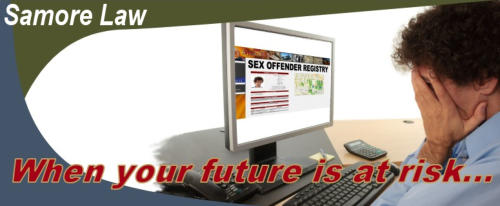


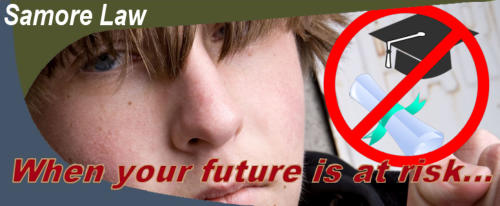
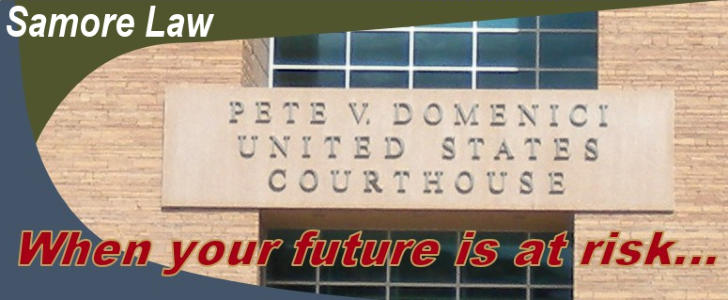
John Samore
Blog: Lawyer’s Insight on
Legal Matters:
- Sex Crimes -
"Lawyer's Insight' is a periodic blog by Mr. Samore
on current legal issues that informs readers how
current, legal events influence Americans' lives. If
you would like to ask Mr. Samore to address a
particular concern which you may have, simply send
an email to the address at left
with subject "Questions for
Lawyer's Insight."
Click on the links below to
quickly reach a particular topic,
or just scroll down to read what
is of interest. Other sources of
information from Mr. Samore
are on the Common Questions
and About Us pages of this website.
If you don’t see a link to a topic of interest, check
the other Lawyer’s Insight pages. You can also see
the Sex Crimes / Sex offenses page.
Sex Crimes
• OEO Allegations Against University Male Students - TITLE IX CASES • Do sex offender registration laws really protect us? • We hear a lot about prosecutions for child pornography; why does your office defend these kind of cases? There is also a case result “UNITED STATES V. Mr. F. [Sex Offense] [Not Guilty on Appeal]” on my ABOUT page that you may want to read.OEO Allegations Against University Male Students -
TITLE IX CASES
August 2020 Another developing area of law, which our office has represented several young men the past few years, is young University male students, who are anonymously accused of violating University policies on sexual misconduct (ex. UNM Student Handbook, Sec. 2740). Only the young man is named in the allegation, made by some anonymous person (usually female), and the student has precious few rights under the recent interpretation of his rights, which make it even more important that he retain an attorney to represent him at the first notice of a complaint. No reasonable person denies that assaults on female students should be seriously addressed. Since 2011, following a broad but flawed investigation into campus assault with that lacked substantive accuracy [1], OEO administrators acted to bolster enforcement, hire investigators to commit to punishing presumed abusers, and monitor enforcement findings. In an eagerness to correct what was perceived as historical underreporting of sexual abuse on campus, OEO severely restricted an accusers opportunity to respond, be heard, and prepare. Funding for each university’s OEO office depend in significant part on the number of cases they attract, investigate, and find policy violations. The Office for Equal Opportunity ("OEO"), claiming authority under Title IX which sensibly compels universities to balance both athletic and academic considerations to prevent gender discrimination in schools that receive public funds, took broad enforcement authority. It has used for the past decade a "single investigator" model, in which the school designee responsible for investigating the assault is also at least one of the three people who make the determination of whether sexual misconduct may have occurred. The young man accused is not informed of his right to counsel by the investigator, and hundreds of young men have had their lives forever changed for the worse, due to an innocent willingness to talk to an investigator without counsel. The present OEO procedure does not give an accused person specific information on what the accuser has told him, she is not identified by name, and he is presumed to already know the scope of the allegation. The disturbing one-sidedness of the OEO process has increasingly been challenged, from many concerned authorities, including the letter from fifty- six Harvard University law professors to OEO (2009) and libertarian commentators [2] to the present President’s Education Secretary. Retired federal judge Nancy Gertner [3] was disturbed by the "low standard for evidence that condemns a young man by a mere preponderance": "True enough, except for the fact that civil trials, at which this standard is implemented follow months, if not years, of discovery (and) is worst in both worlds. The lowest standard of proof(,) coupled with the least protective procedure." Judge Gertner accurately describes how the accused person has virtually no right to learn the details of the allegation, so he risks being adversely judged because he says too much or too little. He is not permitted to directly question his accuser. While OEO investigators repeatedly assure the suspect that its records are "confidential" and it does not work with law enforcement, this representation is a rather brazen, functional fabrication of careful and misleading phrasing. OEO investigators readily forward their interviews, with or without a subpoena, to law enforcement authorities. The illusory representation that OEO investigators not work with law enforcement is further diluted by the fact that University Police often have ready access to these investigations. Once he receives often- horrifying allegations (also horrifying because details are unknown and often greatly exaggerated), the male student has few choices. An adverse OEO finding has grave consequences, but, should the allegation be found unproven, there is absolutely no consequence to the accuser. She gets a free shot at his life. The jeopardy to his academic opportunities and professional future cause some students to consider withdrawing or transferring from school, but OEO does not permit this option. It will continue its OEO investigation and enter its conclusion on the young man's permanent records, even withholding issuance of his transcripts. What this means to the accused is that he has little choice but to blindly participate in an unfair process or almost certainly be guaranteed that OEO will make unilateral adverse presumptions and find against him. OEO headquarters maintain records of each local office at universities to be sure that they find "probable cause of violation of university policy" at a subjectively sufficient percentage. Our own University of New Mexico was one of the universities in the recent past, criticized by OEO and threatened with a reduction of funds for its OEO office because it was not finding "probable cause" at a high enough percentage to satisfy OEO. The risk of bias in the system is obvious, and, because the people in the position of investigation and maintaining its process were hired to such full-time positions based on their beliefs, the likelihood of a fair finding is even more imperiled. An office receives no increased funding if it too often finds against the accusers. Let's take a look at how one of these cases developed when, because the young man decided to fight back and concede his good name would be disclosed in media coverage, resulted in Due-Process litigation. In 2016, the young woman at Kennesaw State University in Georgia claimed she had been raped by a male friend. She admitted the incident began as consensual fooling around and ended in nonconsensual intercourse, then, later, more specifically admitted that she let him spend the night, after which, they ate breakfast together in the morning and planned a date later in the day. Unfortunately, for the young man, he neglected to call back, and when the troubled young woman complained about being stood up to friends, they told her she should file a rape claim against him, which she did. Far too often, as even as many competent attorneys acknowledge, the broken date leads to “regret-sex” allegations. When describing her reluctance to allow an accused male student more information before he is compelled to be interviewed by OEO and balance the system more equally, Noreen Farrell, Executive Director of Equal Rights Advocates, who originally argued in 1977 that Title IX should include sexual harassment violations, now concedes, "We, in the advocacy community, who have been involved in Title IX for decades, understands this (additional rights to protect an accused) is nothing short of a catastrophe." Let us hope the pendulum, which swings from the equilibrium of justice, once against the accuser and now against an accused, may one day return to more balanced stability that is fair and respects all parties. Lawyer and political scholar Cate MacKinnon has been stirring indignation and alarm on male-female relationships for over thirty years, including misrepresenting frequency of sexual assault by claiming a subjective look alone is a sexual assault and that every sexual act "where a man is in the dominant position" equates to "rape" of a woman. Long deemed an extremist, she finally secured a broader audience with more influence on policy ten years ago as universities sought aggressive means to address what they believed were underreported campus assaults. The swing in popular opinion is evident in how acceptable it has become to ridicule men in any forum, be it network media comments or social settings. A tasteless joke or sexist comment about a woman is no less offensive were about a man. They are both wrong, and we all need be conscientious not to tolerate it any more than tolerate sexual assaults. Especially unsettling is how well-meaning people have been so eager to adopt extreme positions that are diabolically prejudicial to an accused person. They have made policy of "safe spaces" on campus and a long list of "trigger" terms that offend them -- ostensibly to protect tender student ears from the contrary opinions that earlier generations thought was the whole idea behind higher education: to learn by confronting and disagreeing with unpleasant. Many feminists and progressive thinkers have finally recognized that student authorities have gone too far. Columbia professor Laura Kipnis reminded OEO zealots, "The feminism I identified with as a student stressed independence and resilience; in the intervening years the climate of sanctimony about student vulnerability has grown too thick to penetrate." Progressive commentator Michelle Goldberg shared concerns that "demand for official censure and emotional injury demonstrate how correct (Dr. Kipnis) is" in her 2015 article for The Nation. Others are concerned that this narrow interpretation of Title IX responsibilities actually objectifies women and seems to erase a women's agency. The current Education Secretary conducted hearing on the bias and revisions that recognizes the accused students rights are scheduled to go into effect in late 2020. Harvard law professor Janet Halley, who long decried the historical "slipshod handling" of sexual- harassment and sex-assault cases, now warns, "It is a moment of danger" in setting boundaries that punish what is often standard campus behavior. "We cannot expect to change behavior without making women part of that equation." She was among the lead group of professors who challenged Harvard's Title IX policies in 2016 and eventually adopted different standard for the law school to the rest of Harvard. New Mexico universities adopted the more extreme OEO procedure which centralizes power into one OEO office that serves as investigator, judge, and jury for the accused student. John Samore adds that process does not afford the accused right of counsel nor do the OEO investigators warn an accused student that it will share his interview records with law enforcement nor do they give the young man a meaningful opportunity to decline to be interviewed. If he were to decline, it is certain that he will be found culpable and sanctioned by the university by expulsion or suspension. There is no consequence for a female student who makes a provably false allegation. As we have seen with United soccer players and Lobo athletes, even old and unproven OEO allegations have consequences that cost them jobs and scholarships. We now have much of feminism at outer poles, one that makes the self-defined "survivor" movement a matter of unquestioning acceptance, the other concerned with a sensible balance where truth is not a matter of faith alone. One that presumes women helpless and the male solely responsible, another that suggests joint responsibility. As Stanford law professor Deborah Rhode describes it, one that holds only the male responsible and another that recognizes the "moral ambiguities of the common dangers (to women and men) of excessive alcohol use." Or as John Samore (a father of five girls) describes it, one that raises children (be they female or male) to be responsible adults, The kind of procedural abuse in OEO campus investigations neither helps women be strong adults nor does it protect the falsely accused. References: [1] NPR and Center for Public Integrity, as well as the Rape Abuse and Incest National Network, each of which developed statistics that defined "rape" so broadly as to include far more alleged victims than it is likely were actually physically assaulted. It left the definition of "rape" largely to the mind of an anonymous group of students from only a few university campuses. [2] The day the Office for Civil Rights sends its letter to the suspect, the federal government has made "all sex unsafe on campus." [3] Judge Nancy Gertner wrote The American Prospect, 2015. See our sex offense crimes page.









Do sex offender registration laws really protect us?
July 26, 2013 As more and more people are being put on state and national sex offender registries, we are discovering the original intent to protect communities also have, in practice, many problems. There are no easy answers. Most of us would agree that some requirement that people convicted of serious sex crimes should have to register so that law authorities would know where they can readily be located can be helpful. Most of us would also agree that, if possible, we would like these convicted people to serve their punishment, fulfill their responsibility to pay their debt to society, get necessary counseling, and have a chance at becoming a productive member of society. How can we expect them to accomplish this transformation unless they can get a good job and have an opportunity to participate in some community? These problems, as we are learning, arise from trying to administer these laws fairly. First of all, some states publish of where these folks live, so they wind up being harassed by mean-spirited people, even beaten, or even killed. Their families, no matter how much they want to help restore their loved one, can also be mistreated and ostracized. If the offender cannot find work, they get discouraged, isolated, and cannot benefit from counseling as they might if they could see light at the end of this tunnel. Another real problem is how very differently our states define the type of crime that requires a person to have to register. The people are not just folks who have done horrible things to children. Many of the crimes for which one must register include Internet behaviors that never result in physical contact. For example, a high school senior could be curious, get on the internet, and look under some websites that may have child pornography. Once he has done so, even if he is only on the website for a few minutes, he has committed a serious felony that can readily be traced. Other folks get convicted for "Romeo-Juliet" relationships where (usually) the male is 18 or older and (usually) the female is under age. The difference between their ages varies from state-to- state, but, whatever the charge, if a person is convicted in one state and required to register, that person must almost always register in any state thereafter in which they might live. If another young man is "sexting" with a person who is under legal age, he can be found guilty of a crime for just that. What strict interpretation of these alleged age differences can be unduly harsh when the parties could be "role-playing" as part of a little flirting game. In some states, it is considered a "sex crime" to simply "annoy" a child, which would require New Mexico to enforce registration requirements that can last from five years to a lifetime. Oftentimes, the time period for compelling registration is set without the judge having the benefit of any "risk assessment' by a qualified psychologist. It is quite a challenge to strike a proper balance to protect us from the few serious offenders who might re-offend and not persecute many others, which may prevent them healing themselves as their victims also heal. Definitions of what actually constitutes a "crime" can always be difficult. define too narrowly, and genuinely bad people cannot be prosecuted; too broadly, and decent people's lives can be ruined. See our sex offense crimes page.We hear a lot about prosecutions for child
pornography; why does your office defend these
kind of cases?
July 5, 2016, updated May 20, 2017 When we attorneys are occasionally asked such a question, our first response is to consider who is asking and why. Usually the questioner is referring to why lawyers represent someone accused of, for example, hurting a child or possessing child pornography. The obvious (and accurate) answer is to pose to the questioner a better question: would you like to live in a society where people accused of especially "bad" crimes are not permitted to have an attorney? Who gets to decide what crime is so bad that the accused person is not even entitled to legal representation? You? Me? Someone else? Even when the evidence is especially strong of a person's guilt, we must also consider whether the penalty prescribed by law is fair. The punishment for most crimes in this country today is already more severe than it was here thirty or eighty years ago and far more severe than it is today in other civilized Western democracies, of which we like to consider ourselves the cultural leader. Here is an example we would like you to consider. Many outstanding citizens in this country have no criminal records, good jobs, and good families, but for some peculiar reason, develop an interest in child pornography. No one will claim child porn is a good thing, but it is all-too-easy for a merely curious person to access it on line. Almost 100% of people who view child porn never physically abuse any children, but the penalties for merely possessing child porn would lock them away in prison for many decades. Does someone who possesses child pornography deserve to spend fifty (or even fifteen) years in prison or should they spend a short time in prison and given an opportunity for treatment of their illness? Which option salvages the person and the family? Which option costs our society less? Oftentimes, the best ally in fairly resolving these difficult decisions can be a reasonable prosecutor. Too many prosecutors become full of themselves and the astounding power they have to push and push and push until the break a person or a crime or a race of people. They are never satisfied at solving a crime they zealously push for maximum punishment and humiliation. Fortunately, some others see the broader picture and take a more balanced approach, doing what they can to be fair and compassionate. They realize that showing compassion or an element of mercy to the culprit does not mean ignoring the actual victim. There is honor in respecting both the accused and the convicted person, as well as an alleged victim. I confess that I consider asking the above topic question myself to certain lawyers. When I say "How can you represent these people?" I am not talking about easy targets such as the poor, the pitiable, and the mentally disturbed who may occasionally commit crimes. I am referring to attorneys who represent the large corporations in fields such as pharmaceuticals (drug companies) and oil and gas and weapons manufacturers and insurance companies who, as a matter of their daily course of business, mislead and deceive and cheat the powerless. You and I are the powerless. By devotion to profit at any cost, these selfish corporations destroy and maim and kill far more lives than all the convicts in this country. Only rarely do these vicious corporations get caught, but they will always have a line of brilliant lawyers who eagerly collect a big paycheck to do all they can to hide the truth to protect the corrupt rich. They can always afford more justice than the 99% of us. How can those lawyers represent those corporations? It is a big reason courageous defense attorneys devote their careers to the working men and women, in some way to help balance the scales of justice. See our sex offense - sex crimes page.